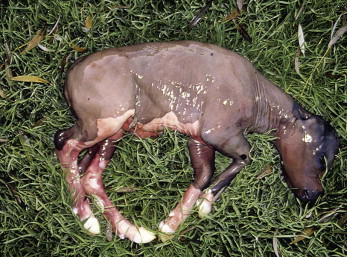

Abortion is the result of a disturbance in the functioning of the afterbirth (placenta). This causes the premature loss of the foetus which may be dead or alive, infected or uninfected. Abortion may occur at any stage of pregnancy and this can be caused by many conditions can cause abortion in sheep and goats.Enzootic abortion is one of the infectious disease that cause abortions in sheep and goats worldwide.
Enzootic abortion (chlamydiosis) is a contagious disease in sheep and goats. It is caused by organisms called Chlamydia psittaci or other strains. It may be found in the intestines of healthy sheep. This organism can also cause disease conditions in several other animal species, and can even cause abortions in pregnant women who handle sick sheep or lambs.
The disease usually spreads among sheep during lambing. Sheep pick up the organism by mouth when they graze in the area contaminated by infected afterbirth or infected uterine fluid of lambing ewes. Outbreaks usually occur within a year or two of bringing the infected sheep onto the farm. The lambs can be infected during birth. Chamydial infection can remain dormant in the ewe lamb until she, in turn aborts during the first pregnancy. The more intensive the sheep-farming enterprise, the more likely it is that the disease will spread through the flock.
The ewe shows no signs of illness. Flocks infected for the first time may have an incidence of up to 70% of abortions. Abortions can occur as early as 3 months, but the foetus is then usually re-absorbed. Ewes may abort in the last month of pregnancy. They may give birth to small, weak lambs that die shortly after birth. Spots of blood above the udder and on the hocks of the ewe are visible and may be the only sign of abortion. Poor lambing percentage is recorded. However, It is unusual for the same female animal to abort twice.
Treatment
The organism can be treated with prolonged, high doses of certain antibiotics, but this is usually neither practical nor economically feasible.
Speak to your animal health technician or state veterinarian for help.
Prevention
Because of lamb deaths and the poor growth of lambs that do not die, it is essential to vaccinate. Oil-based, inactivated vaccine is produced by Onderstepoort Biological Products (OBP) to prevent abortions caused by chlamydial infection. Pregnant ewes can safely be inoculated, if necessary. It is essential to vaccinate before the breeding season, because the vaccine will not give protection against abortion once the foetus has been infected. The ideal time is 4 to 6 weeks before the breeding season.
 Contact Jaguza Support
Contact Jaguza Support